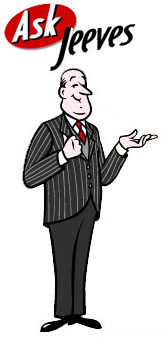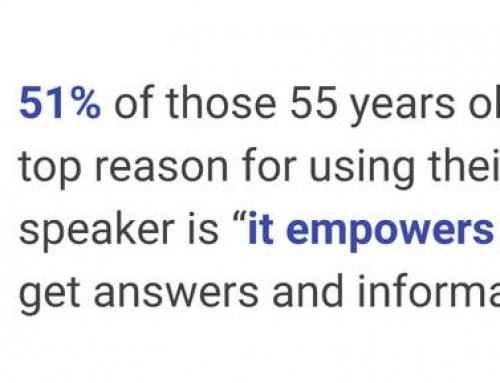Google wants your answers to be questioned.
By Larry Bailin
White Gloves and Silver Platters
In 1996 a wide-eyed search engine came onto the scene with a shiny new brand promise. All your questions would now be answered, and not just answered, but “fetched” by your very own butler named Jeeves. No matter your station in life, all that was required to experience what was previously reserved for the tippy-top of society, was a phone line and access to this brand new thing called “cyberspace”.

Ask Jeeves was onto something with this lofty brand promise of fetching answers to your every question. People now had access to unprecedented amounts of information, which inevitably led to unprecedented amounts of questions.
Here’s where it went south for poor ol’ Jeeves. Even though the information age was gaining momentum faster than a snowball rolling down a black diamond ski slope, search as a service was in its infancy, and not only was there not yet enough information available to answer every conceivable question, the technology had not reached critical mass, the point where nuanced intent could be derived from various questions. Many times, poor Jeeves simply could not fulfill the servant’s mission of providing value to those being served, which didn’t bode well for our white-gloved friend’s job security.
Looking back, Ask Jeeves was no doubt a brilliant concept, but like many others spawned from the early days of the Internet, it was ahead of its time, a decade to be exact. In only a decade, we’ve taken bounding leaps forward to a point in time where the Ask Jeeves promise (as a concept) is attainable, far more reliable, incredibly helpful, universally available and much closer to Jarvis from the Iron Man movies than a white-gloved, silver platter carrying butler persona.
Enter the age of Natural Language Search.
Fast forward to the present day, where the promise of answering all the world’s queries is being fulfilled by tech giants like Google, Apple, Microsoft and amazon, and not just fulfilled, fulfilled LIKE A BOSS!
Search engine behemoth, Google, has successfully indexed over 30 trillion web pages, books, images, products, music and more. And let’s not forget how Google has practically mapped the entire planet, giving the great Google Machine access to every physical location, home, street, store, park and business on the planet!
Now sprinkle in readily available high-speed Internet access with the fact that near 80% of the world’s population is accessing the digital world via smartphone or other mobile device, making us the most hyper-connected society in history and BAM! you have a perfect Natural Language Search storm.
Not only can your every question now be answered in any language or vernacular, but other needs can also be fulfilled, such as taking a note, making a purchase, creating a calendar event or placing a call. No longer are we a society tied to something so pedestrian as a keyboard or dial pad, no sir, we speak into the air within proximity of one of our many devices. We simply speak, and like a genie from a lamp, there’s a flash of light, a pleasing tone and our devices awake to grant our every wish (no smoke, there shouldn’t be any smoke).
The machines have taken over.
Sure, you can still slam your fleshy fingertips into plastic boards of lettered keys, but that’s not special at all. Where the magic really lives, is in your mouth (that doesn’t sound right – but it is). Speaking freely into your smartphone now activates a bevy of natural language assistance apps such as Apple’s Siri, Microsoft’s Cortana or Google’s un-named virtual assistant (recently debuted on the company’s new Pixel phone) and you’re answered by a pleasing voice in the blink of an eye. It all smacks of a Utopian society where unicorns and griffins fill the sky and live in loving harmony.
As if Griffins and Unicorns living harmoniously in the stratosphere was not enough, stand back, because here come the smart home devices. First on the scene, the amazon Echo. A virtual assistant that answers to the name, “Alexa.” Plug in the Echo, connect it to Wi-Fi and grant it access to your amazon Prime account (if you’re not a Prime member, all I can say to you is, COMON! It’s 2017 up in here!) and Alexa comes to life, poised and ready to answer questions, play your favorite song, order you a prolific marketing book or tell you a joke.
Not to be outdone, Google has released Google Home, a stubby vase-shaped device, that like its pixel phone-based counterpart, is nameless. Google Home bursts to life with a flurry of multicolored lights the second it hears the command, “Okay Google”, followed by your question or request. Google home handles a wide array of commands, which can include physical activities such as turning on / off lights, opening blinds and garage doors, adjusting room temperature or controlling just about any powered device in your home. George Jetson would have been well served to own a Google Home or amazon Echo device, when his dog-walking treadmill went haywire, and his wife Jane clearly could not be bothered when George needed to stop that crazy thing.
The opportunity of Natural Language Search
Like it or not, if your business services customers (and whose doesn’t) the Natural Language movement cannot, should not, will not be ignored.
25% of all search queries return a knowledge graph answer box. For the numerically challenged (such as myself) that means 1 in 4 of all searches being performed on the Google machine, are being served answers to a specific question.
Most questions revolve around specific “moments” in a consumer’s journey. These moments can be broken down into four simple desires: I want to know, I want to go, I want to do, I want to buy.
Each of these four moments will be fulfilled by services like Google in very specific ways, but the one constant (and this is where opportunity lives) is, when you take the proper steps to make answers available, Google serves up your answers, and then gives you all the credit, HOT DAMN!
Are you starting to see the magnitude of the opportunity Natural Language Optimization presents? When consumers ask questions, their moments of need are more defined and identifiable. When you market answers to known questions as opposed to concepts based on loosely defined needs, you’re more likely to make deeper connections at the exact time of need. You can pick and choose the moments that can be best monetized, leaving the questions that do not further your buyer’s or your cause, for others to answer. NLO lets you focus on what matters most and solidifies your position as the expert to solve your buyer’s woes.
So how exactly do you take advantage of this rapidly growing evolution in search behavior? To answer that question, it’s important that you understand just how smart and powerful Google’s Natural Language Machine Learning technology is.
Google’s machine learning algorithm is one of the most complex and advanced artificial intelligence technologies on the planet, yet despite all of Google’s algorithmic complexities, at its core, it is fueled by simplicity.
Complete understanding of the workings of something so complex as Google’s Machine Learning is nearly impossible for the average human being to comprehend, but good news, you don’t have to understand the complexities, you just need to leverage (and appreciate) the simplicity. Google’s Natural Language process is so simplistic in function, that it’s almost rhythmic how events unfold. A wonderful example of the ballet-like interaction between Google and a searcher in need of answers can be found in a recent article by Stat Search Analytics. Here is a snippet from that article:
Okay Google, Bake Me a Cake!
It’s a rainy day, and you have a hankering to test out your brand new bundt pan (because there ain’t no party like a Bundt pan party). You say to your Google Home,
But the pressure is on. You have company coming, and you want this cake done before your guests ring the doorbell. [OK Google, how long does it take to cook?] Boom! Even though you bake a cake, not cook it, and you said “it” instead of “Bundt cake,” thanks to Google understanding your intent (by taking your previous search into account), you’re served another piping hot — and relevant — answer from a featured snippet. What does this tell us? These search results, and even the release of Google Home, provide us with a clear understanding of the user experience that Google wants to bring to the table for voice search: quick and easy answers pulled directly from snippets. A decade ago there were a handful (at best) of companies providing a service called Search Engine Optimization (my company was one of the handful), or SEO as we’ve come to affectionately call it today. SEO was a new concept, heck, the Internet was still a new concept, however, for those businesses that could see the opportunity the Internet represented, finding someone to masterfully navigate the waters of search was a must. Natural Language Optimization (NLO) is following a similar path as its SEO counterpart, causing forward leaning organizations to quickly turn their sails toward the bustling winds of change. Finding a company that can connect the dots between Google’s machine learning processes and the nuanced intent of your customer’s questions, and then masterfully serve up answers that matter enough, as to create forward momentum that will lead to customer / provider contact- not an easy task. Data analysts must go on a veritable scavenger hunt, tearing through sales processes, value propositions, real FAQ data derived from conversations, support questions, phone calls, analytics and search data. Once these data scavengers have retrieved their bounty of question and answer combinations, they must now flawlessly implement only the most treasured findings across all your digital customer touchpoints. And only then will you have the opportunity to win. Here’s what you need to be on the hunt for: Persuasion experience. This is not an exercise where merely showing up will prove to be enough to win, masterful persuasion (sales) science must be applied. Winning in the burgeoning Natural Language Space is going to require something special. To paraphrase Liam Neeson from the film, Taken, “I have a very particular set of skills. I will find your questions, and I will answer them.” What are the best questions for you to answer? What are the problems your customers have? What tasks are your customers performing when they are a few steps away from needing you? – These (among many others) are all questions that you need to hear when delving into hiring a Natural Language Optimization Strategist. An NLO Strategist must be able assist you in monetizing the moments, not merely showing up for them. There may be 10 results on page one of Google, but only one gets to be the perfect answer to the perfect question. There will be few winners in the Natural Language space, and if you put forth a half-baked effort, hire a company unprepared for this herculean task, or take a laissez-faire attitude toward this clear evolution in customer search behavior, you’ll quickly become the answer to the question: “who screwed up a huge opportunity to get a ground floor win?” Larry Bailin is a best-selling marketing author, professional keynote speaker and CEO of the award-winning marketing company, Single Throw Marketing. For more information of Natural Language Optimization or other marketing services, Contact Larry Bailin – Click Here. Sources: DMR Stats, Google, Stat Search Analytics Get your own copy of Larry Bailin’s Best-Selling Marketing Book, Mommy, Where Do Customers Come From? 
Google will find your answer, like the one we see above, in the form of a featured snippet, and read it aloud, including the cited source. (Good thing, too, because your hands are already covered in flour and there’s a small grease fire in your oven.)
Natural Language Optimization
Be on the hunt for this skillset.

There will be few winners.
Learn more






